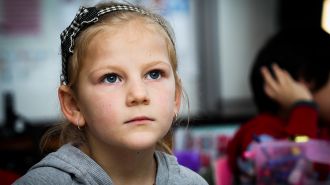
- Our studies
- Our research
- Publications and resources
- Data access and training
- About
- News
- Events
- Get in touch
- Join our mailing list

Welcome to our news and blogs section. Here you’ll find the latest developments and insights from across our longitudinal studies.
UCL and the University of Bristol are to lead the Population Research UK (PRUK) co-ordination hub, part of an existing strategic investment from the UKRI Infrastructure Fund.

Up to 1 in 5 children in the poorest fifth of families display symptoms of mental illness, compared to 1 in 20 children from the richest homes. But according to a new study, mothers’ mental health matters even more.

How has the Millennium Cohort Study (MCS) aided government understanding of the social inequalities faced by young people today?

Girls from the UK’s poorest families tend to start menstruation early, compared to their peers from the richest backgrounds

Children in low-income families have poorer mental health if their parents are juggling several creditors, according to research based on the Millennium Cohort Study (MCS).

Evidence from the 1958, 1970 and millennium cohort studies has underpinned the Government’s Child Obesity Strategy, released today.
Obese boys from the least advantaged neighbourhoods are significantly less likely to lose weight over the course of primary school than their peers in better-off areas, according to new research.
New findings from the Millennium Cohort Study have questioned why poorer children are at higher risk of obesity compared to their better-off peers.
Children whose parents are from poorer backgrounds are more likely to have diagnosable mental health problems, according to new research from the UCL Institute of Education and Centre for Mental Health.

For the first time in the history of the UK birth cohort studies, a short measure of parents’ financial assets and debts is available in childhood (Millennium Cohort Study (MCS), age 11) alongside measures of income. This research project aims to understand how parents’ long-term financial position shapes their children’s outcomes from an early stage.
Girls from well-off families are just as likely to study Science, Technology, Engineering and Maths (STEM) subjects as boys – but gender divides persist for less affluent young people.
An investigation into the effect of growing up in social housing on child development reveals significant changes since the 1970s.

Incorporating seven projects, this programme explored two key themes which are both central to government policy: healthy lifestyles and the transmission of advantage and disadvantage from one generation to the next.
Ryan Bradshaw
Senior Communications Officer
Phone: 020 7612 6516
Email: r.bradshaw@ucl.ac.uk